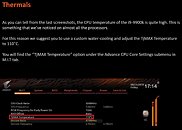- Joined
- Jul 1, 2014
- Messages
- 3,695 (0.97/day)
It seems that by the time NDA drops on Intel's latest and greatest mainstream processor platform, we will have known more about it than ever before with similar launches. GIGABYTE joined the club with the release of their Z390 overclocking (OC) guide specific to their AORUS-branded motherboards. This contains a lot of useful information in general, and we certainly recommend taking a look at it in the source linked in the full post. As it is, a few items in the guide caught our eye- in particular, a direct quote saying "As you can tell from the last screenshots, the CPU temperature of the i9-9900k is quite high. This is something that we've noticed on almost all the processors. For this reason we suggest you to use a custom water-cooling and adjust the TjMAX Temperature to 110°C."
The quote references their guide to achieve a stable 5 GHz overclock on all cores on the Core i9-9900K, which was cooled via a custom watercooled setup and a Vcore ranging from 1.3-1.4 V. GIGABYTE's internal testing thus indicates that these higher end, unlocked 9000-series CPUs will run incredibly hot if you wish to push them, and the soldered IHS may not be as effective in cooling these dense processors as we may have hoped. Indeed, with news of the 28-core Xeon using thermal paste for the IHS, it appears that Intel may be conflicted on optimal cooling when battling the Core Wars with AMD.


View at TechPowerUp Main Site
The quote references their guide to achieve a stable 5 GHz overclock on all cores on the Core i9-9900K, which was cooled via a custom watercooled setup and a Vcore ranging from 1.3-1.4 V. GIGABYTE's internal testing thus indicates that these higher end, unlocked 9000-series CPUs will run incredibly hot if you wish to push them, and the soldered IHS may not be as effective in cooling these dense processors as we may have hoped. Indeed, with news of the 28-core Xeon using thermal paste for the IHS, it appears that Intel may be conflicted on optimal cooling when battling the Core Wars with AMD.


View at TechPowerUp Main Site




